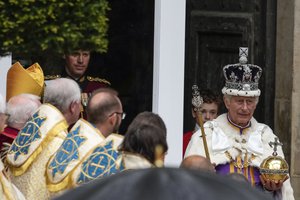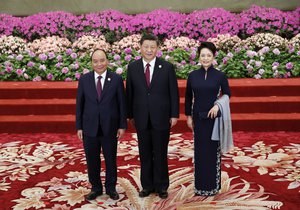Latest News for: retrocession day
Edit
Deepening Threats to Global Peace and Security: Implications of the Kremlin Drone Attack
This Day 07 May 2023
It is against this background that the Retrocession Day (a public holiday to commemorate the return of Taiwan to the Republic of China on 25 October 1945) should be understood. One critical controversy here is the conflict between the significance of Retrocession Day, and the ...
Edit
Taiwan in Time: How many Zhongshan Halls were built in Taiwan?
Taipei Times 20 Nov 2021
In the following days, local politicians and ... It was one of those places where you could see a Peking Opera or watch a military song and dance performance; graduation ceremonies were held there and, during Youth Day or Retrocession Day, there would be grand events there.”.
Edit
The Liberty TImes Editorial: Referendum items are a KMT stunt
Taipei Times 11 Nov 2021
26 event organized by the KMT to commemorate the 76th anniversary of Retrocession Day to speak about the importance of the Republic of China (ROC) ... However, he also said that the “four commitments” laid out by Tsai during her Double Ten National Day address, including a commitment ...
Edit
Taiwan’s truth clearly documented
Taipei Times 30 Oct 2021
By Tom Chang 張晴輝. Members of the US Senate Foreign Relations and Armed Services Committees have begun to forcefully point out the People’s Republic of China’s (PRC) decades-long misuse, misinterpretation and misleading analysis regarding UN Resolution 2758 ... Such evidence strongly suggests that there was no “Taiwan Retrocession Day.” Oct ... 1945 ... .
Edit
October an odd month in Taiwan
Taipei Times 30 Oct 2021
By Jerome Keating ... Oct. 1 is the National Day of the People’s Republic of China (PRC), formally established in 1949, and so the month always begins with PRC posturing ... Ten days later, Taiwanese President Tsai Ing-wen (蔡英文) delivered the National Day speech of the Republic of China (ROC), aka Taiwan ... Oct ... 25 is celebrated by the KMT as Retrocession Day ... .
Edit
KMT would safeguard peace: Chu
Taipei Times 25 Oct 2021
Chu made the remarks at an exhibit at Taipei’s Zhongshan Hall to mark the 76th anniversary of Retrocession Day, when the KMT claims the Japanese ceded Taiwan to the ROC ... Chu said that if the KMT returns to power, he would make Taiwan Retrocession Day a national holiday.
Edit
KMT hopefuls’ focus on deep blue
Taipei Times 01 Sep 2021
10, Double Ten National Day, and was flanked by representatives of the Retrocession Alliance formed of members of the KMT’s deep-blue Huang Fu-hsing (黃復興) faction, including retired generals such as former army commander-in-chief Chen Chen-hsiang (陳鎮湘), Central Military Institute ...
Edit
Political fireworks fuel DC statehood hearing
The Hill 22 Mar 2021
Questioning grew heated Monday at a House hearing over whether the District of Columbia should become the nation's 51st state ... 51 is unconstitutional and a blatant power grab due to the District's Democratic tilt ... James ComerJames (Jamie) R ... D.C ... Retrocession has happened before. In 1846, Virginia took back present-day Arlington and Alexandria counties.
Edit
KMT still clinging onto myth about ROC
Taipei Times 05 Nov 2020
By Chen Ching-kuen 陳慶坤 ... 23, Chinese Nationalist Party (KMT) Chairman Johnny Chiang (江啟臣) expressed the hope that the celebration of Retrocession Day would allow people to discuss and review the relationship between the Republic of China (ROC) and Taiwan, adding that the continued existence of the ROC is the only way to curb Taiwanese independence ... .
Edit
In search of Emersonian scholars
Taipei Times 02 Nov 2020
25 and is called “Retrocession Day.”. The narrative of Retrocession Day was begun and consistently fostered by the Chinese Nationalist Party (KMT) to bolster its image and right to rule ... That treaty stated no recipient of Taiwan and this is what exposes the so-called fake Retrocession Day of 1945.
Edit
Retrocession and finding a collective identity
Taipei Times 28 Oct 2020
On Taiwan’s Retrocession Day on Sunday, China held academic seminars and the Chinese Nationalist Party (KMT) organized a commemorative event, drawing the ire of the Democratic Progressive Party, which said this made it clear that the Chinese Communist Party and the KMT sang the same tune.
Edit
Retrocession Day events not tied to ‘one China’: Ma
Taipei Times 25 Oct 2020
Retrocession paved the way for today’s democracy, freedom and prosperity in Taiwan, and commemorating Retrocession Day is a reminder of the close links between the ROC and Taiwan, Ma wrote, adding that it should be a responsibility of all ROC presidents ... Retrocession Day.
Edit
KMT to hold concert, other events to mark retrocession
Taipei Times 21 Oct 2020
“Taiwan’s retrocession is a day that is very worth commemorating,” she said ... At a time when the DPP administration says that the People’s Republic of China should not hold Retrocession Day activities, it should organize activities of its own to show that the day “is meaningful only when commemorated in the Republic of China,” Wang said.
Edit
KMT to underline ‘important’ ROC link
Taipei Times 19 Oct 2020
The KMT chairman said that Retrocession Day is an important ROC holiday and its celebration had nothing to do with a struggle within the party ... In response to media queries in Taichung, Chiang said that Retrocession Day is an important ROC holiday, and that its celebration had nothing to do with a struggle within the KMT over its party line.
- 1
- 2
- Next page »

















